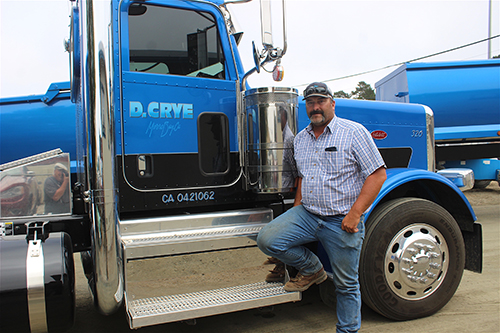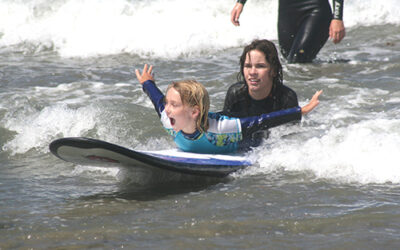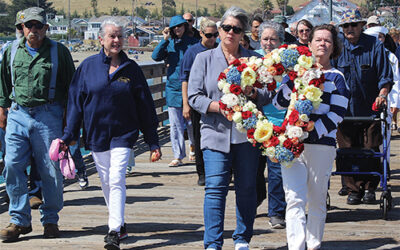Morro Bay’s David Crye, stands with one of his fleet of gravel trucks parked at the construction yard for David Crye General Engineering. Crye has been working his entire life and is enjoying much success in the contracting world.
Lots of people probably feel like they’ve been working just about their whole lives; Morro Bay’s David Crye actually has.
Crye, 42, was born and raised in Morro Bay, part of a multi-generational family that’s called Morro Bay home. His dad, Ed Crye, operated Ed Crye & Son for decades finally retiring a couple of years ago.
“My dad works for me now,” David Crye laughs. “He goes home early once in a while, like 2:30. But he’s 70 now, he’s paid his dues.”
His mom works in the office, the first one here in the morning and the last one to leave, he says. “She’s the one who holds everything together.”
He adds that he never really worked much for his dad, but, “Definitely my work ethic and everything else came from him.” He is the fourth generation of the Crye family operating in the local construction industry and if history repeats itself, his 3-year-old son ought to be getting his first paycheck pretty soon.
Crye talks of his successful business, David Crye General Engineering, Inc., while sitting in what has to be one of the coolest offices anywhere. He explains that the business office in the 1100 block of Quintana Rd., used to be his dad’s shop.
At some point they put in a walk in freezer and a kitchen and over the years the building has hosted big family gatherings and cookouts, and even the butchering of farm animals that everyone shares.
The Crye clan, Ed and wife Bernadette, and David’s sister Cara, who is the CEO of Farm Supply Co., are big supporters of the local ag community.
Crye is truly a self-made man. He drove his first tractor at 3.
“I was five when I went into business for myself,” he says. The 1997 Morro Bay High graduate bought his first piece of equipment — a skip loader — at 15, borrowing money from his grandfather, and started hiring out for dirt work. His parents had to drive him to jobs because he didn’t have a driver’s license.
“Before that, I worked for my uncle Dominguez [Garcia, his mom’s brother]. Summers I’d work for them. I ran my first piece of equipment at 6-years old.”
He got his State contractor’s license at 22, unusually young considering one has to first have years of on-the-job experience.
“I passed the test,” he says. “And it took them a year before they sent my license. I had to provide proof of all the time in the business. Luckily, all the people I’d worked for all wrote letters for me.”
He incorporated in 2001 and has done untold numbers of jobs, from grading a pad for a single house, to grading the site for the Cayucos Sanitary District’s new sewer treatment plant on Toro Creek Road, to finishing repairs on the infamous “Mud Creek Landslide” on Hwy 1, the largest landslide in California history
Paul’s Slide happened in January 2017 and the Mud Creek Slide, about 13 miles south of Paul’s Slide, happened in May. The slides closed Hwy 1 for over a year.
“Back in the day,” he says like an old timer, “a big job was 10,000 or 15,000. Now we’re doing jobs in the millions.”
The Mud Creek Slide was part of what was an extremely busy time, as Crye says they were trucking material to Paul’s Slide (up Hwy 1 near Big Sur) when Mud Creek happened.
The “material,” by the way, was mined at gravel pits that he also owns, a smart move for a grading and roads contractor. Having gravel pits and red rock mines to provide your own materials gives a lot of flexibility in bidding jobs.
He’s actually got four mines — the first one, acquired in 2013, is off Hwy 41 a few miles outside Morro Bay. In 2015 he got two more — one south of Cambria off Hwy 1; another out past Coast Union High School on Santa Rosa Creek Road. This year he got the Navajo Rock Quarry located some 28 miles up Hwy 58 past Santa Margarita. In 2018, he expanded into the landscape business acquiring the Cambria Rock, LLC, near San Simeon.
“It was the best thing for me,” Crye says. “I’ve always needed a challenge. I took over the Morro Bay rock pit first, then the two in Cambria.” The Hwy 58 pit — the Navajo Mine — he acquired just this past March. He supplies aggregates to Monterey, San Luis Obispo and Santa Barbara Counties.
“Having the rock pits and the business,” he explains, “we’re pretty tough to beat.” He has his own fleet of gravel trucks too. “We keep it all in-house for the most part.”
The Mud Creek job pretty much fell in his lap. Caltrans got to a point where they couldn’t extend Madonna’s contract, he explains. “We ended up getting the contract for Mud Creek,” he says. “That one pushed us over the top.” The Mud Creek job was over $20 million.
Recently, Crye landed some nice jobs for the County, fixing roads that were damaged in that terrible winter of 2017, but are just now being repaired.
He’s also landed the job to install the underground piping for the Cayucos Sanitary District’s main line that will run from a lift station next to Hwy 1 out to the new plant.
“I don’t usually chase underground work,” Crye says, explaining why he hasn’t gone after some of the contracts with Morro Bay’s $130 million sewer project.
He’s just not equipped to handle the traffic issues that come with tearing up roads, he says. The CSD job will run almost entirely through farmlands.
With Morro Bay’s project, “We’ll try to supply the materials,” he says.
He just sent off two bid packages, he says, and was planning to bid two more this week. They are also close to finishing two County projects.
With the Mud Creek job, he bought a lot of extra equipment and now has to hustle to keep it busy. He normally has about 28 full time employees and took on 42 for the Mud Creek job, he says.
“We run pretty thin for everything we’ve got going,” he says. Still, with trucks, heavy equipment and ready access to materials, “We’re sitting in the best position for anything that goes on up Hwy 1.”
So what’s the worst thing about his business? All the regulations, and all the emissions stuff that’s come along, he says. “All the machines cost double now because of the emissions.”
On the other hand, “We have such big machines now,” he says, “we’re doing the work a lot faster. It’s all about production — how fast you can do them.
“I like the jobs you can get in and get out.”



